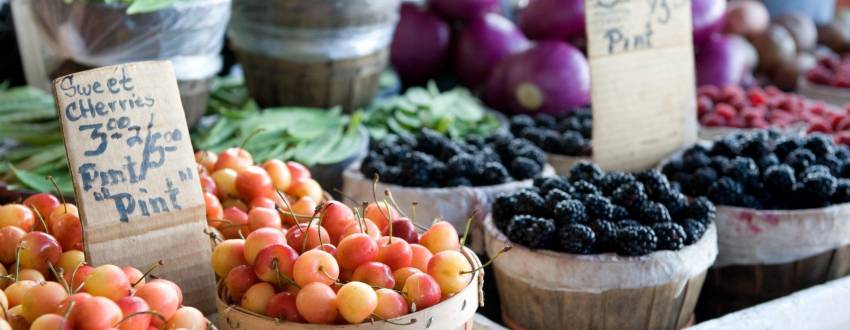By: Mussy Raitman, Lubicom Staff
There is nothing better than a local farmers’ market during the warm summer months.
Where else can you browse through local artists’ work, pick up seasonal fresh fruits and vegetables, and enjoy the sunshine with live music in the background?
Populated with local farmers, vendors, and artists, farmers’ markets are a place where not only are you scoring amazing deals on fresh produce but you’re also supporting your local community.
That being said, for a first-timer, the farmers’ market can be very intimidating. It is nothing like shopping in a grocery store.
I spoke with Liz Rueven (@kosherlikeme), who is a farmers’ market guru. Not only does she shop regularly for her family, but she works with groups of teens, taking them around and showing them the importance of eating healthy and supporting local growers.
Here’s her take on what you need to know to have a great experience.
Mussy Raitman- Do you have a specific time you go to the farmers’ market?
Liz Rueven- I go as early as possible, before it gets too hot and while the vendors and produce are still fresh.
MR- What’s one thing you always bring with you?

LR- My own bags! Not only is it an environmentally sensitive thing to do, but vendors don’t have bags to give to their customers. Sometimes, you can buy reusable bags at certain markets but it’s less risky to bring your own.
MR-Do you only shop with cash?
LR- Our farmers’ market in CT used to be cash-only but now most vendors and farmers use Square and take credit cards. Still, keep a few 10’s tucked into your pocket, just in case.
MR-Do you plan ahead what you’re going to buy?
LR- If I’m preparing to teach a class or to host a dinner at our home, I certainly think ahead. Otherwise, I LOVE to shop without a plan. I allow the mounds of produce to stimulate my imagination, so I form my menu as I shop.
MR- Organic vs. all- natural, what’s the difference?

LR- Organic is a certification that is very expensive and difficult for farmers to obtain. It means that nothing unnatural has been used to assist the farmer in controlling pests and disease. That is why organic produce is more expensive and maybe less attractive. If budget allows, it is always best to buy organic. That said, many environmentally concerned farmers use a practice called Integrated Pest Management, where very limited amounts of pesticides are used and only as a last resort. The expression “Know Your Farmer” is really applicable here. If you begin to shop your greenmarket regularly and gravitate to certain vendors, you will feel more comfortable asking these kinds of questions.
MR- Can you judge produce by its looks?
LR- That’s a great question! In most cases, you can easily see what looks best. But there’s a lot on Instagram about “ugly” vegetables and there’s something valid about that, too. Vegetables and fruit that have been grown without pesticides will most often not look as perfect or uniform as what you’ll find in a supermarket. As Americans, we’re used to perfect fruits and veggies and having plentiful choices all year round. When shopping your farmers’ market, ask your farmer what the difference is between the variety of tomatoes or greens she offers. You may discover that the most beautiful greens are in fact bitter and your family may not like them.

MR- How do you know what’s in season?
LR- By definition, a farmers’ market should only be selling what is in season. Many farmers extend their seasons with hoop houses, which protect their crops from early and late frost and irregular weather conditions. So, you may find tomatoes in the market in October or even November but if you’re seeing them in the coldest winter months, be suspicious. Lots of markets have newsletters that they e-mail weekly. Good ones are full of useful content, including recipes, a list of vendors, and a list of what’s in season (and in the market) each week. Subscribe and learn.
MR- Are all vendors legitimate?
LR- Absolutely not.
Ask vendors where their farm is and what kind of pesticide control they practice. Why make the effort to shop at a greenmarket only to feed your family vegetables and fruit that have been sprayed with poison? There are “jobbers” who appear to be selling farm-fresh goods but are really sourcing them from industrial farms. Buy ONLY from farmers who are farming without pesticides and who are selling their own produce. If a vendor hesitates to answer your questions, move on.
MR- What’s the most frequent question you ask a vendor?
LR- I love to ask which item a farmer is most excited about on a particular day. It might be that watermelons have just ripened, or that corn is finally sweet and abundant. If a farmer is too busy to chat with you, notice what is piled high at their stand. That will be the item they’ve harvested a lot of and the price will be best on that item.
MR- To haggle or not to haggle?
LR- If you’ve ever picked your own blueberries, and know how long it takes to fill a quart on a buggy, steaming hot day, you’ll be sensitive to pricing. NEVER haggle.
MR- Do you stock up on seasonal items and freeze/store it away?
LR- I buy blueberries, strawberries, and peaches, and flash-freeze them on sheet pans, then toss them into ziplock bags to use during the winter. Be sure to label with date and tasting notes, if you have any, i.e.: “very sweet” or “needs sugar.” Your own notes will cue you in to what’s needed when you want to bake with these treasures long after the peak of the season has passed.
MR- What’s an item you buy every time?

LR- I can’t pass up local tomatoes and always buy fresh greens for salads, stir-fries, and smoothies. If you wash greens in advance of using them, be sure to spin them very dry and wrap in a clean dishtowel. Place in the crisper drawer of your refrigerator, which will keep them fresh for up to a week.
MR- Thank you, Liz!
LR- If you’ve never checked out the closet farmers market, the summer is your opportune time to start. There is seriously nothing better than a pint of organically grown berries or a bag of farm-fresh corn on the cob.
What’s more, a trip to the market can totally cure the kids’ whining on long summer days.
You never know. A trip to the farmers’ market might become your new family summer tradition.






Reviews